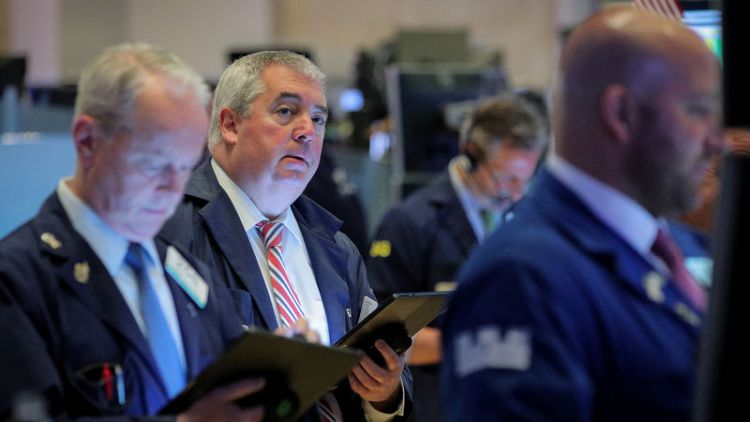By David Randall
NEW YORK (Reuters) - World stock markets climbed for the first time this week on Thursday, giving pause to a multiday selloff on fears of an escalating trade war between the United States and China that has pushed investors into safe-haven bonds and the U.S. dollar.
Signs that the year-long trade dispute between the U.S. and China will not be resolved quickly and concerns over its impact on global growth have roiled markets, sending stock indexes into their most turbulent month of the year so far.
"We oppose a trade war but are not afraid of a trade war," Chinese Vice Foreign Minister Zhang Hanhui said on Thursday in Beijing, when asked about the tensions with the United States.
"This kind of deliberately provoking trade dispute is naked economic terrorism, economic chauvinism, economic bullying," he said.
His comments followed reports from Chinese newspapers that Beijing could use its rare earth supplies as a bargaining chip https://www.reuters.com/article/us-usa-china-rareearth-explainer/explainer-chinas-rare-earth-supplies-could-be-vital-bargaining-chip-in-u-s-trade-war-idUSKCN1T00EK to strike back at Washington after U.S. President Donald Trump remarked he was "not yet ready" to make a deal with China over trade.
Rare earth supplies are elements used in production in industries such as renewable energy technology, oil refinery, electronics and glass. There have been concerns that China, a key exporter of rare earths to the United States, may use that fact as leverage in the trade spat.
"People are trying to figure out how much of the bad news is already priced in. The trade war looks like it might dampen growth but not enough to throw us into a recession," said Scott Brown, chief economist at Raymond James in St. Petersburg, Florida.
"There has been talk about the Fed possibly cutting rates and that is a little bit positive for the stock market."
MSCI's gauge of stocks across the globe gained 0.22%.
On Wall Street, the Dow Jones Industrial Average rose 43.47 points, or 0.17%, to 25,169.88, the S&P 500 gained 5.85 points, or 0.21%, to 2,788.87 and the Nasdaq Composite added 20.41 points, or 0.27%, to 7,567.72.
The pan-European STOXX 600 index rose 0.42%.
German Bund yields climbed for the first time in four days after hitting record lows and Treasury yields climbed. Money markets are now pricing in roughly two U.S. rate cuts by the start of next year as trade worries weigh on the global economy.
The dollar index, tracking the greenback against six major currencies, was steady at 98.113 and in reach of a two-year peak of 98.371 set last week.
"The strength in the dollar is surprising given that markets are now expecting multiple rate cuts by 2020," Commerzbank FX strategist Ulrich Leuchtmann said.
Oil prices fell after an industry report showed a smaller-than-expected decline in U.S. crude inventories. [O/R]
That followed volatile trading on Wednesday, when oil prices fell to near three-month lows at one point as trade war fears gripped the commodity markets.
U.S. crude futures were down 1.9% at $57.69 per barrel. Brent crude was down 2.9% at $67.42 per barrel.
(Reporting by David Randall; Editing by Bernadette Baum, Diane Craft and Susan Thomas)



